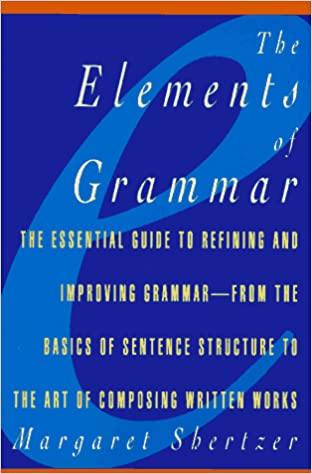I previously reviewed Arthur Plotnik’s “The Elements of Editing” and Strunk and White’s “The Elements of Style”, both of which are worthy reads. Shertzer’s The Elements of Grammar was the third of the three volume set I purchased years ago and finally sat down to read.
First, it’s a quick read. At least I found it so, and perhaps because I still remember Mrs. Woodbury’s 4th grade class in which grammar played a major role.
My volume is from 1986 (I mentioned years ago, right?) and is based on a 1950s text. I was fascinated by how much grammar rules have changed, and anthrolinguists should give this a good read as it shows language shifts recognizable in retrospect. Case in point, “like,” as in “So he said, like…”
It did clear up several confusions I had in my own work (mostly because I remember what I was taught – good job, Mrs. Woodbury! – and some editors are more current in their grammar than I). It still serves as a good general reference. Examples:
- Final, concise definitions of active v passive voice
- Ditto adverbs
- The different purposes of different adverbial forms (this one was new to me. I’d only recently become aware of differences)
- Adjective to adverbial forms (when and how to use)
- Waste adverbs
- Proper use of prepositions (good refresher for me)
- Proper use of a comma (I had to read carefully to realize they were using the Oxford comma when demonstrating series. Other uses explained a lot to me)
- How to handle clauses
- Proper use of semicolons (I learned one of the rules from an editor friend, and it was nice to have a reason for it beyond “it makes the sentence look cleaner.”)
- Proper use of a colon (lots of uses I didn’t know about)
- Possessives (and with a nod to The Elements of Style, a good refresher)
- Forming compound adjectives (my editor always catches me on this. You’d think I’d learn)
- Several pages on words used in place of each other incorrectly (example: exceed, accede)
In the end, definitely a keeper and thoroughly dog-eared, it’ll be on my shelf within easy reach for easy (and no doubt repeated) reference.
But is it necessary reading? I’d say not really. It’s a good, quick read, but not necessary. Most writers hire editors (some are much better than others. I can recommend one if you need) to handle these things. I know some publishers who use machine editors and I’d hate to be the person programming such a beast – the intricacies and delicacies of grammar are monumental.

